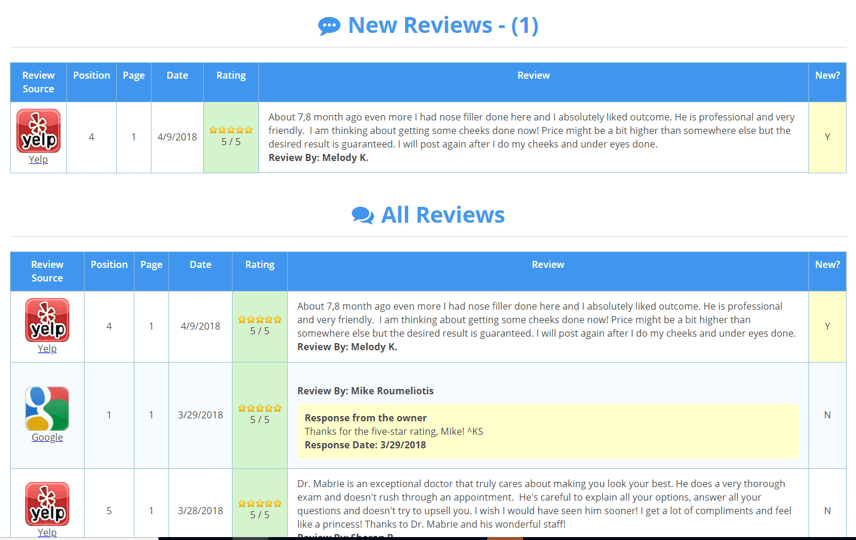Online reviews are today’s word-of-mouth — and they stick around, good or bad. With that in mind, each and every review of your practice (positive or negative) deserves a thoughtful response. In elective healthcare, crafting appropriate responses to online feedback can be a little tricky, so it’s especially important to equip your staff to handle patient reviews well.
In this video, CEO Ryan Miller discusses the importance of learning how to respond to your online critics, as well as the three key leadership essentials to preserving and enhancing your online reputation.
Video Transcription
Just a couple of weeks ago we received notice that one of our clients was coming under attack. A number of reviews had been published by someone claiming to be the sister of a patient and then in all of her reviews she used over and over again the word “butcher” in reference to the doctor. Now, unfortunately for many practices, that’s all too real of a scenario and the question we’re going to talk about today is what do you do in the face of, well, not just critical, but also positive online reviews. Do you respond or do you not respond?
Types of Reactions
Think about this exact scenario. Someone’s attacking you online. What’s your first reaction? For most practices, it’s going to fall into one of three categories:
Fight
It’s going to be a reaction where you want to fight, where you want to defend yourself. And in fact, in this particular case that was the doctor’s first impulse was to strike back and try to set the record straight.
Hide
I think all too many practices, their default reaction is to hide either because they’re unaware that the review has even appeared or they simply don’t know what to do or not comfortable responding to that particular kind of review.
Make Peace
But what we want to counsel as the third option here, which is to try and make peace in a very public way to declare your empathy for the reviewer and your commitment to the satisfaction of all of your patients.
3 Steps for Responding to Reviews
So one thing I think is important for us all to understand is if your impulse is to ignore those negative reviews – no response from the practice is a kind of response. It shows that you are either unaware or completely apathetic to the concerns of your patients. And that’s the wrong message to send.
So as a practice leader, there are three things that you need to be thinking about to be prepared to handle these kinds of situations.
- Monitoring – Obviously we needed to be aware that this was happening to be able to formulate any kind of response at all.
- Accountability – We need accountability inside the practice. We need a Reputation Champion who is there to provide the counseling, the direction, to do the legwork and to ensure that not only are we responding to reviews as they appear, but we’re actively cultivating positive reviews to support the reputation of your practice.
- Training – We need the protocols to guide us and to guide our teams so that we have a measured response in the face of a really scary situation.
Monitoring
Now let’s talk about the first of these which is monitoring. We knew that this was happening and we knew that it was happening within just a few hours because of the monitoring solutions that we deploy for our clients. For those that don’t work with Etna, it’s very likely that your agency partner can recommend a reputation monitoring solution for you that will keep you aware as new reviews appear.
Now in this case, we got an email just a few hours later. It looks something like this:

As we go deeper into that message, it gives us a view of both what new reviews are appearing and how we’re doing responding to them overall. This is called a dashboard. You want a solution like this in place to keep you aware of changes in your reputation online. Now I have one pro tip here. Keep in mind, especially for practices that rely heavily on insurance, certain directories can’t easily be monitored. Things like the directories that are provided by insurance companies that you work with are often protected for members only by logins and passwords. So you may need to set a reminder to monitor those particular sites manually. The same thing is going to be true of certain password protected sites like Angie’s List.
So coming back to it, what you want to make sure that you implement right away is some kind of automated monitoring solution that’s running each and every day alerting you should a new – whether it’s positive or negative – should a new review appear.
Accountability
Now, the second thing we need to talk about is accountability. Because we all know that if somebody isn’t accountable, it simply doesn’t get done and we don’t want you to be a practice where it’s nobody’s job to be mindful of the practice reputation. So designating somebody who can be a Reputation Champion inside your office is important. This isn’t about hiring a new role. Think about modifying the job description of a member of your team to include three key activities:
- Monitoring. They’re the person who will receive and will interpret the reports as they come in.
- Reporting. Being present inside of staff meetings or leadership meetings to talk about how patients are perceiving their experience in your office online.
- Responding. Guiding the way that you react when new reviews appear.
Training
Now the third and final piece, as we think about this, we need to get the training and the coaching for your team. So, there’s a guy out there that was big in the search engine optimization industry for many, many years. His name is Matt Cutts. He said this, that the only answer to bad speech is more speech.

And when you come under fire from a patient, or in the example that I gave a sister, you ultimately need to be present in the conversation to ensure a truly representative message from your office is present online.
So how do we respond? We’re going to spend a little bit more time here than anywhere else. We need to get the facts before we act. Now in this particular case, to protect their privacy, we’ll refer to them as Beth and Sue. Beth was the patient. Sue was her sister. Well, what we learned within a few days is that Beth was just a few days out from her surgery, wasn’t feeling like maybe she had made the right decision, had some concerns, and was going through her normal process of recovery. And, got on the phone with her sister who lives several states away and had complained. Her sister got defensive and in a moment of anger lashed out in these public forums. Now, as it turns out, a couple days later, by the time that we had reached her, the patient had settled down and we were able because we took the time to get the facts before any kind of inflammatory reaction, we’re able to speak one on one with the patient and find out that she actually was doing just fine and she became our ally in resetting the expectations with her sister so that we could correct the problem with those negative reviews.
When we do respond online, we want to respond exactly once. We don’t want to engage in a dialogue, especially with conflicted patients on the Internet, and we want to offer gracious acknowledgement. We want to thank the person for sharing the feedback, whether it is complimentary or critical. We want to remain objective and professional remembering that what you publish is going to be a direct reflection on you and on your brand. And we don’t want to introduce any new information about the patient, right? We want to respect their privacy.
Now, as I mention the word “privacy”, I know a lot of you are going to go here, which is HIPAA, and the reality is I have it on the best authority that HIPAA is not in fact a barrier for you to respond to reviews online. HIPAA was originally designed to cover your communications around insurance reimbursement from our government.
Neither of those two criteria relate to patients posting reviews in the public sphere. Now, we still want to protect their privacy, so remember when you’re responding online, you don’t offer additional information about their experience or their treatment inside your office. So with that said, what do I say then? Well, you say thank you even if they’re a critic. You take the care to respect their privacy. You speak about how you’re going to address their concerns, if in fact there’s a concern inside that review, and then you invite them to contact you or a member of your leadership directly. It’s very, very simple.
I like this particular example, it came from Tom Seery over at RealSelf a number of years ago, because it typifies really well the kind review that you can share in response to a concern that’s expressed in that public forum online. Each one of those replies needs to be personalized to the individual reviewer.
“Our practice encourages patients to share their experiences. In fact, our greatest source of new referrals are our past patients. We are 100% dedicated to seeing patients achieve safe outcomes and ask that any past patient with a concern contact us directly.” – Tom Seery, RealSelf
Now, let’s just touch a moment more on the mechanics. So how specifically are we going to be responding? Well, we want to get in there as early as possible. In this specific example I gave you with Beth and Sue, one of those reviews appeared on Google My Business, the practice’s prominent Google listing. We knew from the GMB Insights that almost 16,000 people a month were being exposed to that listing on Google so it was important that we act very, very quickly. We want to have it come from a member of the senior staff. In a small practice it might be the doctor or the practice manager. In addition to that, remember what I said before, you respond once. Even if the patient comes back, you don’t engage in a dialogue in that public sphere. And of course, include your contact information. Make it easy for the person to call or email the practice so that they can work with you to try to remedy that concern.
Now, bottom line, the thing I want you to take away, it’s our position that every review deserves a response, positive or negative, you were there and you’re a part of that conversation. And as a practice leader, you’re going to take action now to make sure that you have the monitoring in place, that you have accountability built into your own team through the addition or the declaration of someone who can be your Reputation Champion. And in addition to that, you’re going to take the time, hopefully through your agency partner like us here at Etna to make sure they’re properly trained, that you have the understanding and the resources to handle positive or negative reviews with absolute grace.
If you want to learn more, you know how to reach us, you can find us online at etnainteractive.com. Be sure that you subscribe to our email newsletter, you can follow us on Facebook and if you have questions, as usual, we welcome them. Thanks so much and have a great day.


How do you address fake reviews?
Fake reviews are extremely common, both positive and negative. The unfortunate truth is that there is little you can do to combat either.
In either case, it can be difficult to identify the reviewer. And even when you recognize the reviewer, sharing aspects of their treatment would violate patient privacy.
FAKE POSITIVE REVIEWS
If you can substantiate that a practice is involved in “astroturfing,” publishing fake positive reviews, you should submit a formal complaint with your evidence to your state or province’s medical licensing authority.
FAKE NEGATIVE REVIEWS
All of the reputable rating and review websites have published policies about what content is acceptable on their site. When you suspect that a review is false, each site has a unique protocol whereby you can submit a request to have the review removed. Take care to build a clear case as to why the review specifically violates that site’s terms of use.
Keep in mind that it is very unlikely the review will be removed. I can think of an instance where a client received a fake review criticizing the outcome of a procedure he had never performed. Even though we could offer evidence from the practice management and scheduling software that the procedure mentioned in the review was not offered or performed by the practice the review website refused to remove the review.
In all cases, the best defense is a good offense. In online reputation the saying goes, “the solution to pollution is dilution.” By focusing on delivering exceptional outcomes and customer service, and encouraging your patients to share their experiences online, you will earn ample positive reviews to protect yourself against an occasional negative review.
I hope this helps!
~Ryan